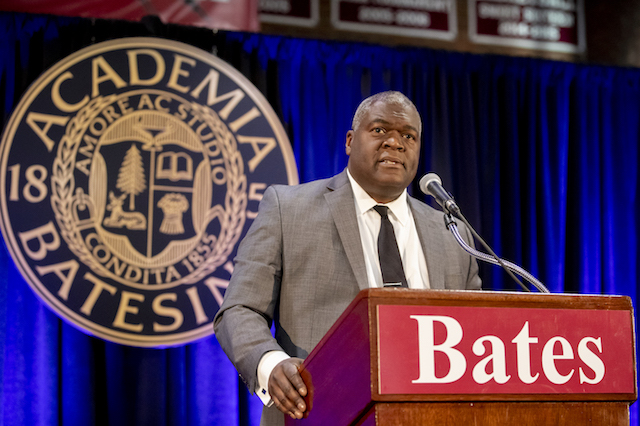Bringing the notion of informed civic action into fresh context

At the Harward Center, we are continually inspired and challenged by the Bates College mission statement, especially its call to cultivate “informed civic action.” So, we were delighted when in his introduction to this year’s Martin Luther King Jr. Day keynote speech at Bates, professor Michael Sargent (Psychology) brought the notion of informed civic action into fresh context. We hope you enjoy this excerpt from his introduction.
Good morning.
To students of the college, to my faculty and staff colleagues, to President Spencer, to all administration and trustees, to our fellow Mainers (both those born here and those who have come from around the world to live here), I want to say how pleased I am to see you here on this day. I also want to acknowledge our elders, whose memory we sustain and whose legacy we embody, including indigenous elders whose land we are on today, and our elders who were brought here in chains and whose forced labor was a foundation upon which these United States were built.
As we gather today, I recall beginning my career at Bates in the fall of 1999, which, as one of my students recently reminded me was before he was even born, so at least in student-time, a long, long time ago. I recall learning then that we at Bates cancel classes on Martin Luther King Jr. Day, but I also recall having it drilled into me that it’s “a day on, and not a day off.” As tempting as it might be to sleep in, or to venture out to play in the snow, to truly be a member of the Bates community is to engage with the events of this day.
But what does it mean for this to be a “day on”? In what sense are we “on”? Obviously, it means that we remain active—we remain activated. But to what end? In my view, this is a day when we are “on mission,” that is to say, we remain aligned with the college’s mission. In the closing words of our mission statement, “With ardor and devotion — Amore ac Studio — we engage the transformative power of our differences, cultivating intellectual discovery and informed civic action.”
Personally, I have often heard students and colleagues refer to “the transformative power of our differences,” and that embrace of diversity as a source of power is important, and you will be invited to do so throughout today. But right now, I want to emphasize the latter parts of the mission statement: “cultivating intellectual discovery and informed civic action.” Intellectual discovery obviously has value in its own right, but it has added value when it informs the actions we take to make our communities and our world more just. And engaging in such action can help us avoid a specific danger: When our words signal a commitment to social justice—including my earlier acknowledgment of indigenous elders and elders in chains—there is a danger that, by themselves, those words amount to nothing more than empty gestures. But civic action can give those words meaning, and today, you each have the opportunity to participate in activities that cultivate intellectual discovery in the service of civic action that is well-informed.
In doing so, you will follow in the footsteps of Dr. King. He’s widely known for his rhetoric and his action, but before he was a civil rights leader and before he was a minister, he was what you will each be today: a student, engaged in intellectual discovery that can inform later civic action.
All of you who are sociology majors can take pride in the fact that King’s Morehouse College B.A. was in sociology. (And if your families ask what one can do with a sociology degree, well now you can add “Nobel prizewinning civil rights leader” to the list of possibilities.) After graduating, King went on to Crozer Theological Seminary, and according to political scientist Karuna Mantena, it was there that the foundations of King’s philosophy of nonviolence were laid—beginning with a lecture by Mordecai Johnson, a lecture that inspired King to immediately go out and buy half a dozen books on Gandhi.
Just as that lecture by Johnson helped King the student begin informing the civic action of King the leader, I hope today can help you inform your own action.